The story I've been trying to tell with my blog during the year has had very much to do with how we place ourselves within the natural world, and how we try to understand the context of which we are a part.
In terms of evolution, I wanted to say something about about how many misinterpret our position in the evolutionary tree. By using deceptive terms such as "higher" or "lower" organisms we cheat many wonderful creatures out of the high standing they should have in order to misappropriate the peak position for ourselves. A proper understanding of evolutionary trees is the cure for this, and evolutionary trees are probably the best and most allegorical way of visualizing evolution, something Darwin understood very well.
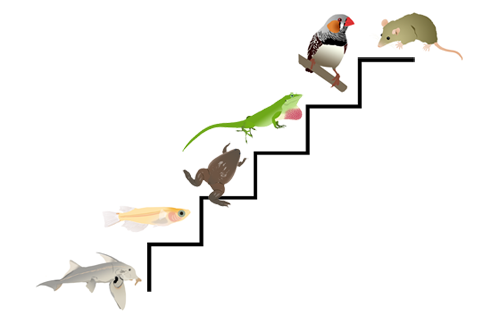
Wrong. The evolutionary "flight of stairs".
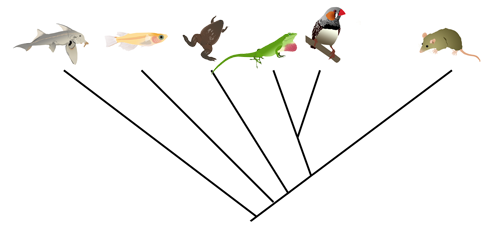
Right. The evolutionary tree.
I got the chance to bring the point home even more by using the example of the Discus fish, and the deep evolutionary connection between mammalian lactation and the fishes' secretion of mucus from their skin. This post won me a blog award, my first one ever, and was picked up as a ResearchBlogging.org editor's selection. I'm planning on expanding on the subject of the marvellousness of fish and the vertebrate evolutionary tree during this year.
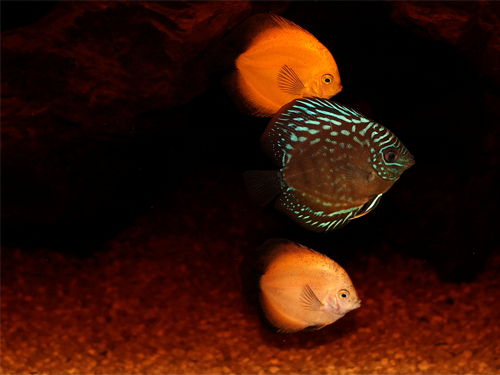
Discus fish (Symphysodon aequifasciatus). Ref: Flickr.
The big science controversy of the year, NASA's "arsenic life form", also gave me a reason to talk about, in a very wide sense, how misinterpretations of science can lead to a general misunderstanding of how life is disposed. I wrote two posts about "arsenic life" which were quite well-visited and linked by several other blogs.
In addition to talking about deep evolutionary connections, I also commented a little bit on how evolution can help us be better citizens by understanding the diversity of the human population.
In terms of religion and neuroscience, I've learned a few things that strengthen the view that religious belief, at least in part, is an "offshoot" of those neural substrates that otherwise are behind out social cognition: Believers base their estimation of god's will and belief on their own beliefs, which could show that morality and personal beliefs are native to human cognition. In this case, as in many others, god is only in the mind of the believer. This was probably the most visited post from this year, and it was picked up by SEED magazine. At the same time, nobody is born with a belief in god already in their minds. There is evidence that children have a very strong bias towards believing the verbal testimony of adults that they trust, which provides a convincing model to explain how religious belief is passed on from one generation to the next.
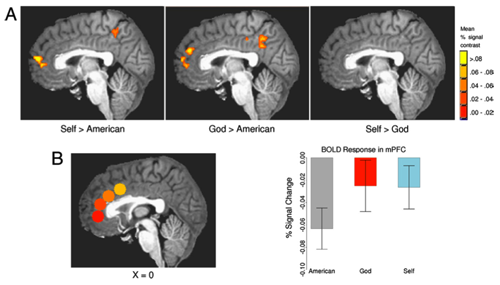
Thinking about god's beliefs. Ref: N. Epley et. al. (see link above)
While we're talking about children, the ability to separate conscious agents, which are capable of creating order, from inanimate objects, which tend to create disorder, seems to arise very early in life and is very difficult to shake. This could help explain why the beliefs in order and intentionality in nature, such as creationism, are so prevalent, and why it's so difficult to observe nature and evolution as being devoid of intentionality. It brings us back to the deceptive interpretation of evolution as being a progression that led to us "higher" organisms that I mentioned above. Could this even be a major reason why there is religious belief at all? This post was also picked up as an editor's selection at ResearchBlogging.org.
Certainly, abandoning those difficult to shake conceptions that underlie religious belief many times requires going against intuition, but I doubt that atheists are more intelligent than believers under any definition of intelligence that tells us something about the evolution of the human mind. However, a big U.S. study by The Pew Forum published in September seemed to confirm that atheists know a lot more about religion than most religious believers, which could be seen as evidence for the idea that atheism and agnosticism are the result of knowledge.
Speaking of intelligence, I wrote a couple of posts that deal with the brain and intelligence: One about the remarkable (?) characteristics of Einstein's brain, and one about how the lack of understanding about how the brain develops, functions as it builds itself, leads to eccentric propositions about the feasibility of artificial "reverse-engineered" brains.
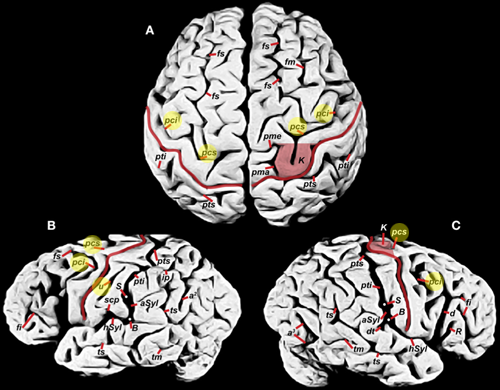
Einstein's brain. Ref: Falk (see link above)
In short, I've wanted to highlight how we can think about our place within the greater evolutionary and natural scheme of things, and the often common ways in which we have an erroneous view of where we fit into it all. I hope the thread, although tenuous and tangled, is there. I feel 2011 is going to be a lot more about whole genomes and evolution; as I'm nearing the and of my thesis work I want to write more about how genes and gene sequences can inform our knowledge of how the great transitions and innovations of vertebrate evolution have happened. As different genome sequences keep getting better, and most of all more numerous!, I'm going to have a lot to write about.
*) A "half-time" thesis in Swedish graduate school is basically a check-point in your thesis work where you defend the work you have done during the first half of your Phd education in front of an opposing committee. It's like a "mini-dissertation" in preparation for the real thing.
Nice post Daniel, 2011 will definitely be the year of whole genomes and evolution.
ReplyDelete